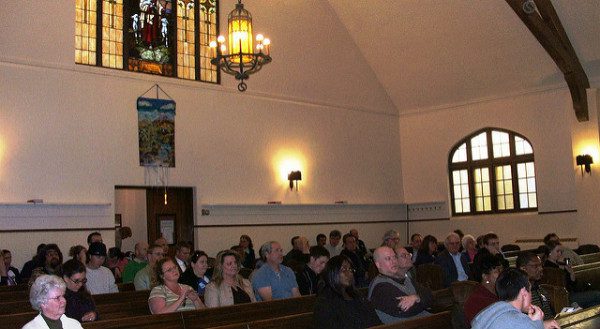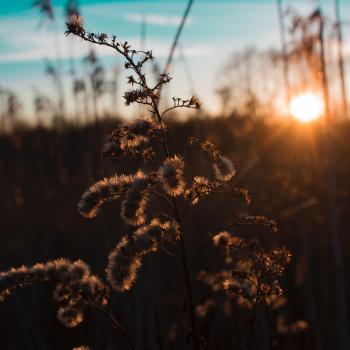Here it is, well past Fall Equinox, and I’m did not mark the holiday in any particular way. Litha and Lughnasadh slipped by as well. After 30 years of rituals for the Solstices, Equinoxes, and cross quarter days I’m a little puzzled that I’m not feeling the lack of the seasonal rituals more keenly. I have gained some other spiritual practices that sustain me, but they are mostly personal practices. The extent of “corporate worship” for me is when I attend Sunday services at my local UU congregation. This is rare since I’m either presenting a Sunday service or taking a needed Sunday off from work.

Corporate worship is what distinguishes seekers following a personal spiritual path from those creating lasting religious communities. Some say that the “spiritual but not religious” are folks who want the benefits of spirituality without the work of doing it in community, and that without community practice, you can never truly grow. The word corporate comes from the word corp which we also see in “corporeal”, or embodied. Corporate worship means worship with the whole religious body. In Christian circles the people of the congregations are the body of Christ, so corporate worship is when the body of Christ comes together.
Corporate worship is worship done with your community.
It is possible that the prediction I heard from my Seminary professors came true… When you become a minister you lose your church. At the time I laughed, “Ha ha!” I said, “my church is not just in the UU sanctuary doing the “hymn sandwich” my church is out in nature with witches and druids and earth-relating folks. I’ll never lose THAT!” Turns out I was wrong. What those professors meant was that as a minister I needed to be set apart from the congregation. I was a leader, a servant, a counselor and a prophet, but not a member or friend. When you lose your congregation you lose the corporate worship as well.
Part of it is the fact that as a professional ritual-maker I am impatient with most ritual, whether outside in nature, inside in pews, or in the fellowship hall in an improvised circle. I have not experienced the transformation of consciousness or the emotional depth or the one-ness with others that I associated with successful ritual.
Somehow I’m frustrated by the lack of ritual in Sunday services while I’m frustrated with a lack of resonance in my local Pagan groups and a lack of either in CUUPS rituals. I’m pretty sure that much of my frustration comes from me being picky. But is that a bad thing? I think it is sort of my job.
So, where can those of us who have had “peak” ritual experiences,, those of us whose job it is to find ways to create better religious experiences, find fulfilling, transformative corporate worship?
I think we need to keep trying to create it, together, for one-another.
There have been moments when I’ve experienced chills, or depth, or a sense of powerful recognition…
- The worship leader asked us to relate to the four directions, not as intellectual concepts, and not as theater, but in our bones. She asked us to breath deeply and exhale windily so that we all would hear the sound of the moving air. She asked us to stomp our feet (or hands) so we would all feel the solidity of the earth and experience it together. She asked us to snap or clap or jingle our keys so we’d feel the power of the community. She asked us to snap or tap, moving from one side of the room to the other so we could be reminded of our connections to the power of nature.
- The homily was broken into several parts, woven seamlessly with the songs. Each piece had meaning and connected the next piece.
- The whole service flowed together being handled by people who were completely relaxed and confident with what they were doing. Each of the many contributors added their piece without anxiety, layering in paint of the picture being painted in our mind’s eyes.
What is interesting to me is that these experiences happened on Sunday morning, with all the people of the congregation together AND that they are elements drawn from Pagan traditions held in the softened framework of the much maligned “hymn sandwich.” The hymn sandwich is the term used for the traditional protestant form of worship. Words, singing, words, singing, words, singing, words. It can be done well and has the charm of anything that is very familiar and comforting to many. It can be sterile, disconnected, rote, dis-embodied, and stale.
So I want that feeling back, that feeling of being a part of one larger body, but I’m not sure how to do that. I do think that a part of the path back into an integral whole involves a merge of Pagan and traditional Protestant worship.
There’s another dynamic at play though… The urgency of the pain in the world. I wonder if I am reluctant to go into the vulnerability of worshipping with others, and reluctant to open myself to the joy of worshipping with others, when I am aware of the fear, desperation, righteous anger and pain among my siblings, my city, country, and all the earth?
A colleague responded to this question with, “where is the line between the despair, anger and sadness I feel and the need I have to experience, express and feel beauty? Where is that line personally and publicly? For me, I am thinking that hard times need as much truth, transparency, firm action, understanding of the vulnerability of ourselves and each other, fierce love and and as much beauty as possible.”
Another colleague asks: “Wondering (for a friend…) Did it feel like this before? The doubt, the fear, the despair? The faith that love will “win” against an overwhelming mountain of evidence that love is so easily crushed under the footfalls of fear? Did it feel this way in Selma? In Montgomery? In Little Rock? Soweto? All of Europe in the ’30’s? Did it feel this way in the autumn of 1860 in the U.S.? Wondering … (for a friend.)”
And again, I remember the advice from my seminary professors (most of them!): “When you are in the most distress, when life feels busiest, when the world feels most broken, that is when you need to pray more, worship more, be in community more.”
We need to gather together, in one strong body. To sing together, to make meaning together, to connect to beauty together. (Click here for a link to a UU choir singing the hymn “Gathered Here.”)
What do you do to connect to beauty, with others? What do you do for corporate worship? Are you a part of the whole body of your religious community? What has moved you out of, or into that community? What will you change?













